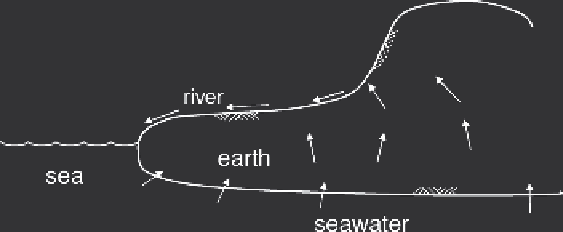Geoscience Reference
In-Depth Information
Fig. 14.1 Sketch of the seawater filtration theory of the Presocratic philosophers in ancient Greece. The
written evidence points to Hippon as the earliest proponent of this concept, but it was probably
Thales with whom it originated.
Thales of Miletos in Ionia flourished around 585 BCE, and he is generally considered
to be the first Greek natural philosopher, with whom the formal inquiry started into the
reality behind the changes in the Universe. He does not appear to have committed his ideas
to writing, and no actual quotations of him have survived. While there is nothing on the
origin of rivers or springs, the essence of Thales' views is well known and two of the most
important ones are contained in the above passage; these are that the first principle of
everything is water, and that the Earth rests on water. Hippon is mentioned here in the
same breath as Thales, so it would be surprising if Hippon's opinion on the origin of
rivers were very different from that of the old master. It is, therefore, difficult to dis-
agree with Gilbert's (1907) opinion that Thales can reasonably be considered, as the
actual originator of the seawater filtration theory, at least among the Greeks. But the roots
of this theory may actually be much older. It is now known (see Eliade, 1978) that as
early as the third millennium BCE, that is some 2000 years before Thales, in Sumer in
lower Mesopotamia it was already a well established view that the Earth rests on the
ocean.
Hippon's fragment does not mention the removal of the salt. But this aspect of the theory
can be deduced from Aristotle's (1952, II 354 b,15) description, in his objections to this
theory, some 200 years later.
It was this difficulty which led people to suppose that the sea was the primary source of moisture and
of all water. So some say that rivers not only flow into it but out of it, and that the salt water becomes
drinkable by being filtered.
This is a clear indication that the theory was around at the time of Aristotle and that it was
taken seriously by many of his contemporaries.
Rainfall percolation theory
The earliest seeds of this second theory appear in the philosophical views of Anaximander
of Miletos; Anaximander, a younger associate of Thales, was born around 610 BCE, and
must have been in his prime around 565 BCE. While the issue of the origin of streams
and rivers is not addressed directly, his main views can be deduced from the remaining
evidence (see also Gilbert, 1907, p. 405). On the nature and the origin of the sea, Alexander
of Aphrodisias, a well-known commentator, who flourished around 200 CE, summarized
Anaximander's views as follows (Diels, 1879, p. 494).

